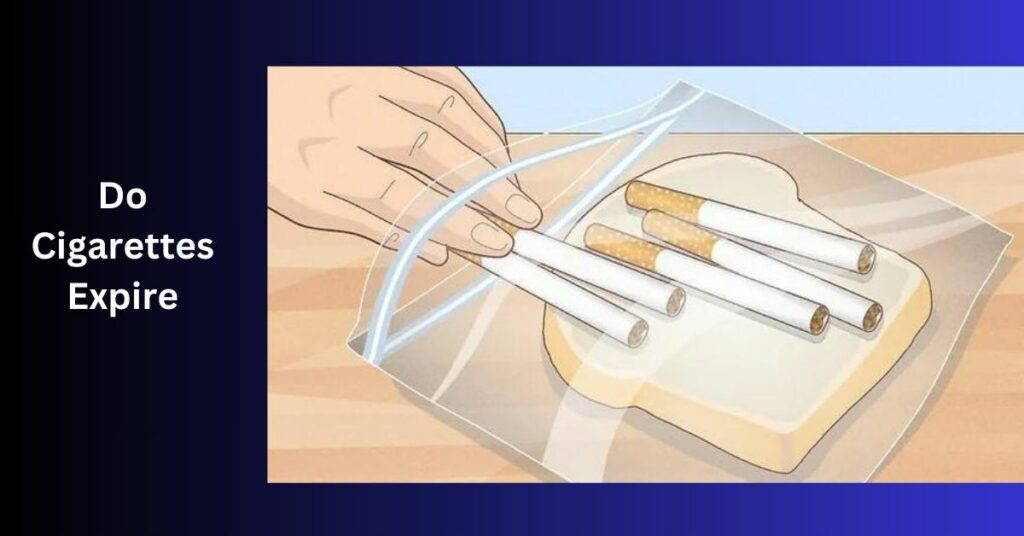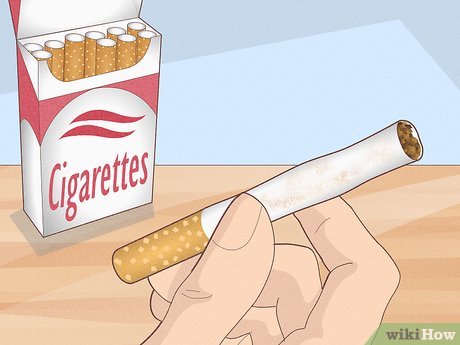Do Cigarettes Expire – Let’s Talk About It!

Many people are curious about whether cigarettes go bad over time. It’s a common question, but the answer isn’t as straightforward as expected.
Cigarettes don’t have a clear expiration date like food products do. However, their quality can decline over time due to factors like exposure to air and moisture, impacting their taste and freshness.
Ever wondered if cigarettes have a “best before” date? Let’s clear the smoke on whether they expire!
Understanding The Basics – What Are Cigarettes Made Of!
Cigarettes may seem simple at first glance, but their composition is more complex than meets the eye. At the heart of every cigarette is tobacco, specifically dried and processed tobacco leaves.
However, the journey from tobacco plant to cigarette involves a series of treatments and enhancements. Manufacturers carefully blend different types of tobacco to achieve desired flavors, nicotine levels, and burning characteristics.
In addition to tobacco, cigarettes contain a myriad of additives and preservatives. These substances serve various purposes, such as enhancing flavor, stabilizing combustion, and prolonging shelf life.
For instance, sugars may be added to create a smoother smoke, while humectants help retain moisture and prevent tobacco from drying out.
Additionally, preservatives inhibit microbial growth and prevent spoilage, ensuring that cigarettes maintain quality over time.
Factors Affecting Cigarette Expiration – Prolong Your Cigarette Freshness Now!

Cigarette expiration is influenced by various factors that impact the quality and shelf life of tobacco products. Understanding these factors can help consumers assess the freshness and safety of cigarettes. Some of the key factors affecting cigarette expiration include:
1. Tobacco Quality and Processing:
The quality of tobacco leaves and the processing techniques used significantly impact the shelf life of cigarettes.
High-quality tobacco processed carefully tends to retain its flavor and freshness for longer periods. Conversely, lower-quality tobacco or improper processing methods can lead to faster degradation and a shorter shelf life.
2. Packaging and Storage Conditions:
The packaging and storage conditions play a crucial role in determining cigarette expiration. Cigarettes stored in airtight, moisture-resistant packaging are less likely to degrade quickly.
Air, light, and moisture exposure can accelerate tobacco breakdown, leading to a shorter shelf life.
3. Exposure to Air and Moisture:
Exposure to air and moisture is a primary factor in cigarette expiration. Humid conditions or leaving cigarettes unsealed can allow moisture to penetrate the packaging, causing the tobacco to become stale or moldy.
Exposure to air can also lead to oxidation, resulting in a deterioration of flavor and quality.
Do Cigarettes Have An Expiration Date – Know About It!
Unlike food products or medications, cigarettes typically do not have an official expiration date printed on the packaging. However, this does not mean that cigarettes remain fresh indefinitely.
While tobacco products do not technically expire in the same way as perishable goods, they can degrade over time, affecting their taste, aroma, and overall smoking experience.
Factors such as the quality of tobacco, storage conditions, and packaging play significant roles in determining how long cigarettes remain usable.
While cigarettes may not spoil or become harmful after a certain period, they can lose their freshness and flavor over time.
Consumers must consider the condition of cigarettes before smoking them, particularly if they have been stored for an extended period.
Stale or degraded cigarettes may not provide the same smoking experience as fresh ones. Therefore, while cigarettes may not have an official expiration date, it’s advisable to use them within a reasonable timeframe to ensure the best smoking experience.
Environmental Impact Of Expired Cigarettes – Discard Expired Cigarettes Responsibly!

The disposal of expired or unused cigarettes can have significant environmental consequences. When cigarettes are discarded, either partially smoked or completely unused, their chemical compounds can leach into the soil and waterways, posing risks to ecosystems and wildlife.
Cigarette filters, primarily made of cellulose acetate, a type of plastic, can take years to degrade. When improperly disposed of, these filters accumulate in the environment, contributing to plastic pollution.
Marine animals, such as seabirds and marine mammals, can ingest or become entangled in cigarette litter, leading to injury or death.
Additionally, the combustion of cigarettes releases harmful chemicals into the atmosphere, contributing to air pollution and climate change.
The production, distribution, and disposal of cigarettes also require significant resources, including water, energy, and land, further exacerbating environmental degradation.
Effects Of Cigarettes On Human Health – Quit Smoking For A Better Tomorrow!
Cigarette smoking is widely recognized as a major risk factor for various health problems, both acute and chronic.
The harmful effects of cigarettes on human health are well-documented and extend beyond the respiratory system to impact nearly every organ in the body.
1. Respiratory System:
Smoking cigarettes can cause a range of respiratory issues, including chronic bronchitis, emphysema, and lung cancer.
The inhalation of tobacco smoke damages the airways and lung tissue, leading to inflammation, reduced lung function, and an increased risk of developing respiratory diseases.
2. Cardiovascular System:
Smoking is a leading cause of cardiovascular diseases, such as coronary artery disease, stroke, and peripheral artery disease.
The chemicals in tobacco smoke promote plaque formation in the arteries, narrowing blood vessels and restricting blood flow. This can lead to high blood pressure, heart attacks, and other cardiovascular complications.
3. Cancer:
Cigarette smoking is the primary cause of several types of cancer, including lung cancer, throat cancer, and esophageal cancer.
The carcinogens present in tobacco smoke can damage DNA and trigger abnormal cell growth, leading to the formation of tumors in various organs and tissues.
4. Reproductive Health:
Smoking can have adverse effects on reproductive health, affecting both male and female fertility. In men, smoking can reduce sperm quality and increase the risk of erectile dysfunction.
In women, smoking during pregnancy is associated with complications such as miscarriage, preterm birth, and low birth weight.
FAQS:
1. What happens if you smoke expired cigarettes?
Smoking expired cigarettes may result in a harsher taste and reduced enjoyment due to staleness. However, they are not typically harmful to smoke unless they have been exposed to extreme conditions or contamination.
2. How can you tell if cigarettes are expired?
Signs that cigarettes may be expired include a stale or off-putting odor, a dry or brittle texture, and a change in flavor. Additionally, the packaging may indicate an expiration date or a “best by” date.
3. Can you still smoke cigarettes after they expire?
While smoking expired cigarettes may not pose significant health risks, they may not provide the same smoking experience as fresh cigarettes. It’s ultimately up to the individual’s preference whether to smoke expired cigarettes or not.
Conclusion:
Cigarettes, unlike food, lack a clear expiration date. However, prolonged exposure to air and moisture can degrade their quality, affecting taste and freshness.
Read:




